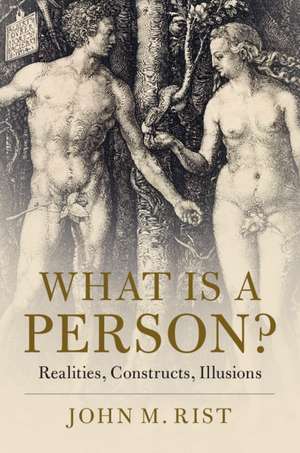What is a Person?: Realities, Constructs, Illusions
Autor John M. Risten Limba Engleză Hardback – 18 dec 2019
Preț: 242.54 lei
Nou
Puncte Express: 364
Preț estimativ în valută:
46.41€ • 48.58$ • 38.63£
46.41€ • 48.58$ • 38.63£
Carte tipărită la comandă
Livrare economică 31 martie-14 aprilie
Preluare comenzi: 021 569.72.76
Specificații
ISBN-13: 9781108478076
ISBN-10: 1108478077
Pagini: 294
Dimensiuni: 160 x 234 x 20 mm
Greutate: 0.54 kg
Editura: Cambridge University Press
Colecția Cambridge University Press
Locul publicării:New York, United States
ISBN-10: 1108478077
Pagini: 294
Dimensiuni: 160 x 234 x 20 mm
Greutate: 0.54 kg
Editura: Cambridge University Press
Colecția Cambridge University Press
Locul publicării:New York, United States
Cuprins
Part I. Constructing the 'Mainline Tradition': 1. The first foundations: Plato and Aristotle; 2. From Stoic individuals and personae to Christian persons; 3. Mixtures: Plotinus, Porphyry, Nemesius; 4. Augustine's personae: theology, metaphysics, history; 5. The definition: Boethius and Richard of Saint Victor; 6. Toward a synthesis: Thomas Aquinas; 7. Between two worlds: Duns Scotus; Part II. No God, No Soul; What Person?: 8. Virtue, 'virtue', rights; 9. Descartes on soul, self, mind, nature; 10. Personal identity from Hobbes to Locke; 11. After Locke; 12. Sympathy or empathy: Richardson, Hume, Smith; 13. Ambiguous Rousseau's soul and 'moi'; 14. Kant's rational autonomy; Part III. Toward Disabling the Person: 15. Introducing the five ways; 16. Assimilation and homogenization; 17. The way of Prometheus; 18. Whistling in the humanitarian wind; 19. Virtual morality: propaganda as social glue; 20. The way to an absolute nihilism; Part IV. Persons Restored or Final Solution?: 21. Parfit and Heidegger; 22. Strawson and Nagel; 23. Personalism, phenomenology, Edith Stein; 24. God made Adam and Eve.
Recenzii
'John M. Rist describes how the 'mainline' understanding of the human person arose, how it became shaken in early modern thinking, and finally shattered in the suspicions of the nineteenth and the nihilism of the twentieth centuries. Using Heidegger as a foil and Edith Stein as a resource, he shows how the mainline tradition can be reaffirmed and even enhanced by its history; he argues that we can do better than 'the ethics of wishful thinking', which some might see as the only option available now. His book is a major contribution to both cultural and philosophical understanding.' Robert Sokolowski, Elizabeth Breckenridge Caldwell Professor of Philosophy, Catholic University of America
'Few issues in philosophy are more urgent and enigmatic than the concept of a 'person'. Eminent Platonic scholar and trenchant moralist, John M. Rist weighs in on the question with characteristic verve and formidable learning. The elegant sweep of his vision of the 'Mainline Tradition', and its critique and evolution since the Enlightenment, is remarkable, while the polemical and constructive thrust of his own arguments is arresting.' Douglas Hedley, University of Cambridge
'Deeply entrenched in the Catholic-Christian tradition, this investigation offers a provocative account of the concept 'person' from Plato to the present.' H. Storl, Choice
'What is a Person? is the fruit of enormous learning and a mind capable of contextualizing philosophers differing in language, culture, and historical contexts in a clear, memorable style of exposition.' Christopher Kaczor, The Thomist
'Few issues in philosophy are more urgent and enigmatic than the concept of a 'person'. Eminent Platonic scholar and trenchant moralist, John M. Rist weighs in on the question with characteristic verve and formidable learning. The elegant sweep of his vision of the 'Mainline Tradition', and its critique and evolution since the Enlightenment, is remarkable, while the polemical and constructive thrust of his own arguments is arresting.' Douglas Hedley, University of Cambridge
'Deeply entrenched in the Catholic-Christian tradition, this investigation offers a provocative account of the concept 'person' from Plato to the present.' H. Storl, Choice
'What is a Person? is the fruit of enormous learning and a mind capable of contextualizing philosophers differing in language, culture, and historical contexts in a clear, memorable style of exposition.' Christopher Kaczor, The Thomist
Notă biografică
Descriere
Explores how the concept of person developed from both non-Christian and Christian sources and the ensuing of post-Christian culture.
